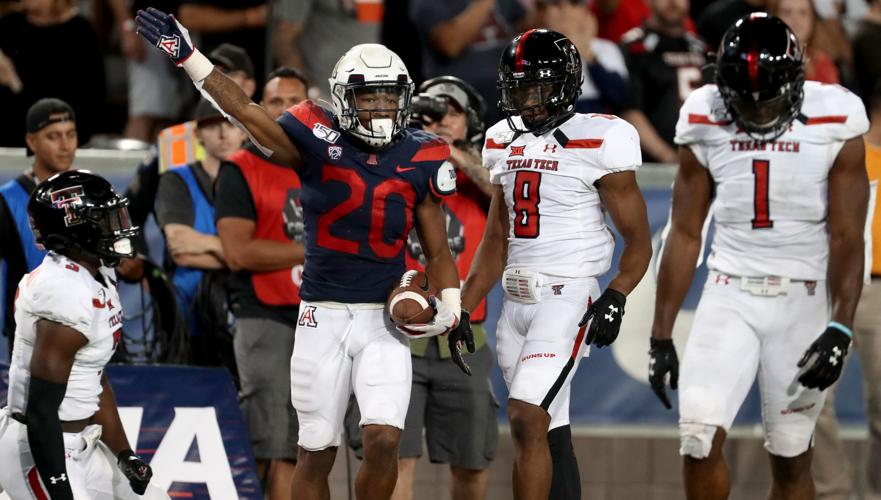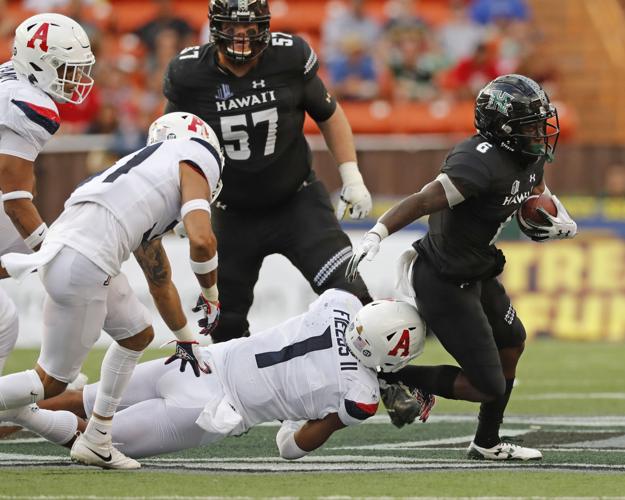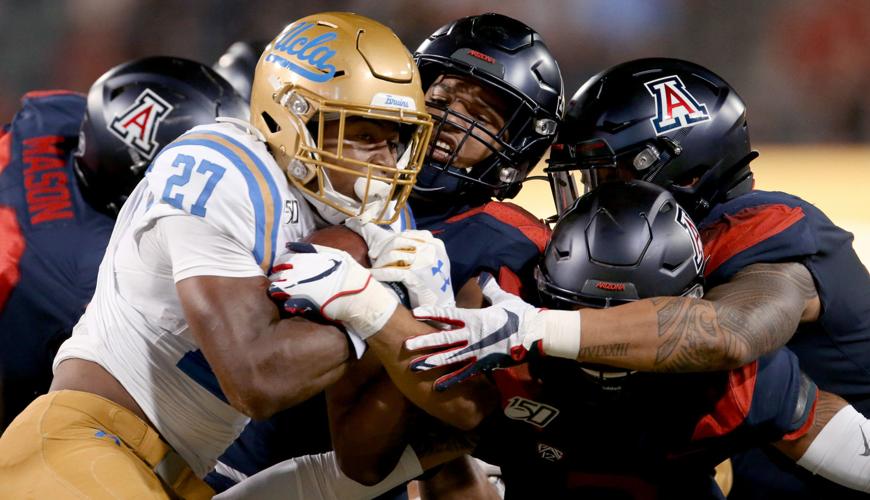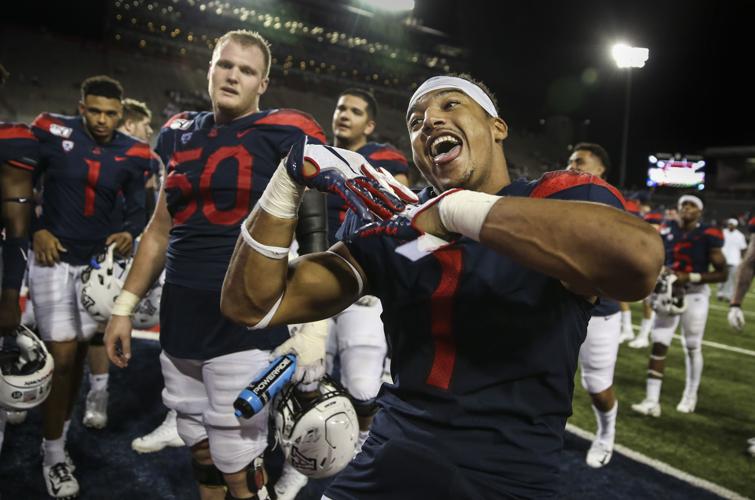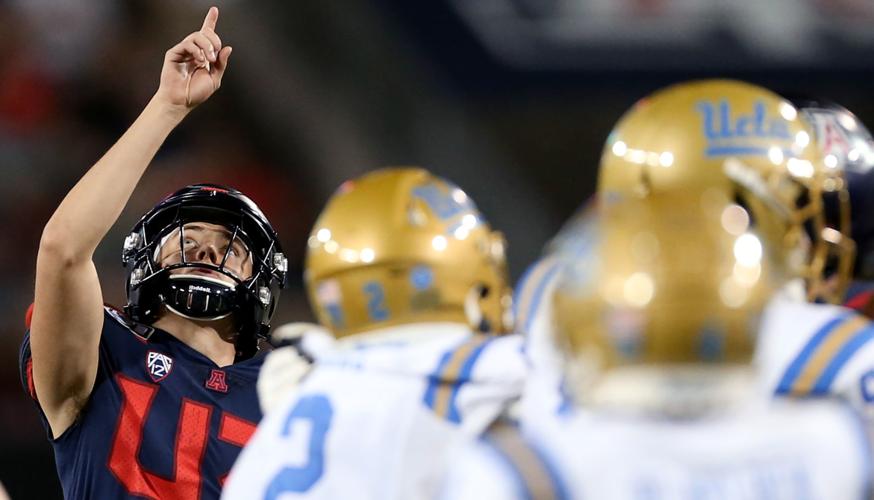On the surface, the fact that Washington lost at Stanford last week — and didn’t look particularly good doing it — should be bad news for the Arizona Wildcats.
Saturday night’s contest at Arizona Stadium was supposed to be the Huskies’ “lookahead game” with Oregon on the docket next week. Now, Washington is looking to bounce back and put its season back on course.
Presented with that idea, UA coach Kevin Sumlin quickly dismissed it. He noted that Arizona has no control over its opponents’ performance or mindset. He also has been around long enough to see a loss — or a win — affect a team in different ways.
“You win, you get momentum,” Sumlin said. “You lose, what, are you mad? Whatever happened last week has nothing to do with this week. It really doesn’t.”
Sumlin has been preaching a “1-0 mentality” to his players since training camp. Don’t look back. Don’t look ahead. Just focus on getting better every day and winning that particular week.
And yet …
Multiple Wildcats have said the team derived great value from its season-opening loss at Hawaii — and still is, a month and a half later.
“It gave us a reality check,” cornerback Lorenzo Burns said. “We just can’t have the mentality of we’re going to go out there and just beat anybody that we play.”
“We just have that chip on our shoulder,” receiver Tayvian Cunningham added. “We have a loss, and we just want to never have that feeling again.”
They haven’t. The Cats have won four straight games since falling 45-38 in Honolulu on Aug. 24. Arizona (4-1, 2-0 Pac-12) has looked like a different team since.
Heading into Saturday’s matchup against Washington (4-2, 1-2), here are four ways the Hawaii loss has positively impacted the UA — none of which is easily quantifiable:
1. It reiterated the importance of preparation.

Arizona linebacker Tony Fields II (1) tries to pull down Hawaii wide receiver Cedric Byrd II (6) during the second quarter of an NCAA college football game Saturday, Aug. 24, 2019, in Honolulu. (AP Photo/Marco Garcia)
Arizona had a bye after the Hawaii game and won its next contest 65-41 over Northern Arizona. But few Wildcats left the stadium feeling satisfied that night.
It wasn’t until the following week that Arizona put together a complete game — a 28-14 win over Texas Tech, its first nonconference Power 5 conference foe since 2012.
Sumlin’s message afterward was clear: “Remember what it took for this feeling. Remember what happened this week. Remember how we approached it.”
Sumlin had been stressing how critical preparation is since he got here; it just took a while for that lesson to completely take root.
Tailback Nathan Tilford was asked after last week’s win at Colorado if the victory would give the Wildcats momentum moving forward. He returned to the process, noting the importance of “doing things throughout the whole week, Monday through Friday, staying locked in, paying attention in film, hard work during practice, conditioning, all that stuff.”
Those close to the program say Arizona’s execution during practice gradually has gotten crisper over the past year-plus. (The Wildcats’ in-season practices are closed to media observation.) Sumlin never has had an issue with the team’s effort or intensity. But receiver Jamarye Joiner went so far as to say that games are “easier than practice.”
Tackle Donovan Laie concurred, saying the key to Arizona’s strong fourth-quarter showings of late — a 29-3 scoring advantage over the past three games — is “just making sure that practice is harder than the game. Going harder in every drill that we do.”
Concluded Burns: “We have to go out and prepare like every game is a championship game.”
2. It turned the Wildcats into underdogs.

UCLA running back Joshua Kelley (27) gets stacked up by a host of Arizona defenders on an unsuccessful run in the first quarter of their Pac-12 football game at Arizona Stadium, Tucson, Sept. 28, 2019.
Arizona was favored by 10.5 points over Hawaii, a Group of Five team that has turned out to be pretty good. The Rainbow Warriors are 4-1 entering their game at No. 14 Boise State on Saturday night.
At the time, though, the loss felt like a tangible step backward. On the heels of a 5-7 season that ended with discouraging defeats to Washington State and Arizona State, Sumlin and his staff were roundly criticized by media and fans.
Several players expressed the notion that they felt almost abandoned by their supposed supporters. The motto displayed in the locker room — “It’s about us” — became a rallying cry. The Wildcats turned perceived disrespect into motivational fodder. It isn’t the most original tack, but it seems to be working.
Arizona was a consensus 6.5-point underdog against Washington as of Friday evening. That seemed to suit the Wildcats just fine.
“We have to go out and earn respect every single Saturday,” Burns said. “I love it. People don’t think about us. You guys try to keep us under the table. And now we’re popping out. … We like surprising people.”
3. It enhanced team chemistry.

The Arizona Wildcats celebrate their win over the Texas Tech Red Raiders during a game at Arizona Stadium Saturday, Sept. 14, 2019. The Wildcats won the game with a final of 28-14.
Losing the opener — and having a portion of the outside world turn against them — might have brought the Wildcats closer together.
Sumlin said it was a “big deal” that the entire team — offense, defense, special teams — gathered during a timeout before Colorado’s do-or-die fourth-down play late in the fourth quarter.
“Team chemistry — I feel that’s the biggest thing that’s changed,” sophomore safety Christian Young said. “We all bought into what the coaches have been saying. The leaders have brought us in, saying we need to be this type of defense, we need to bring defense to this school.”
It isn’t just the defense that’s buying in. After the Colorado game, a reporter asked quarterback Khalil Tate — Arizona’s best-known player — about passing for a career-high 404 yards. He genuinely seemed unaware of the feat and deflected praise to his teammates.
“Whenever we win a game, it’s all about the team,” Tate said. “I’m excited for the guys.”
The process of building cohesiveness isn’t limited to the playing field. Cunningham, a newly arrived junior college transfer, is rooming with four returning veterans. They have made him feel welcome.
“We’re locked in, because we grinded together,” Cunningham said. “When you get that bond with everybody on the team, you just want to see everybody do good.”
4. It showed Arizona has more fight than last year’s team.

Arizona place kicker Lucas Havrisik (43) gestures skywards after hitting a field goal against UCLA in the second quarter of their Pac-12 football game at Arizona Stadium, Tucson, Sept. 28, 2019.
All losses count the same. But they aren’t all created equal.
Arizona trailed Hawaii 14-0 at the end of the first quarter. In similar scenarios during Sumlin’s first season — Houston, Utah, WSU — the Wildcats folded.
This time they rallied. They twice tied the score. Tate came within a yard on the game’s final play of setting up a possible two-point conversion to send Arizona home a winner.
Since then, the Wildcats have won games in all sorts of ways. They’ve won by blowout. They’ve won with their running game. They’ve won with a freshman subbing for Tate. They’ve won when the running game wasn’t working. They’ve won at home. They’ve won on the road.
What does all that say about them?
“That we’re some fighters,” Tilford said. “We got heart.”
Added Burns: “It’s just goes to show that we’re a strong team. There might be some games where the defense is not doing their job, or the offense is not doing their job. Regardless of that … we’re going to come together and get the W. We fight to the end. We’re very resilient.”
The concern entering Saturday night is that the Huskies’ recent loss — which some have dubbed the worst of the Chris Petersen era — will have a similar effect on them. The Cats fully expect a dogfight.
“Of course,” Laie said. “I think most teams are like that. But we’re fired up to keep winning.”


